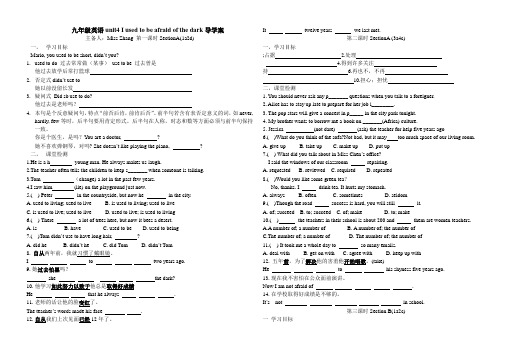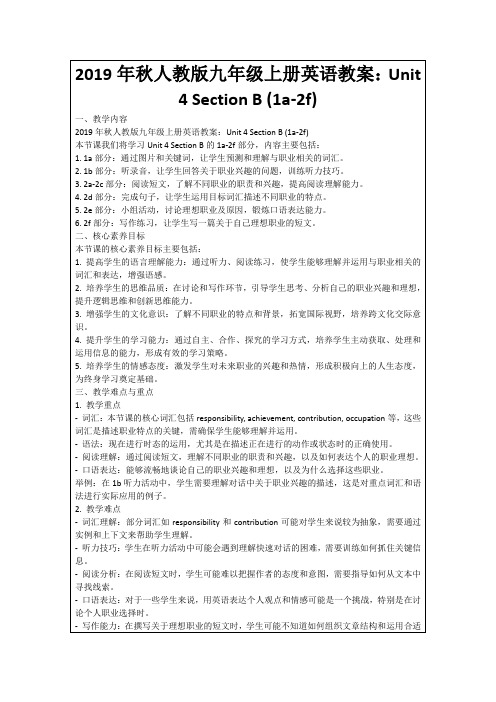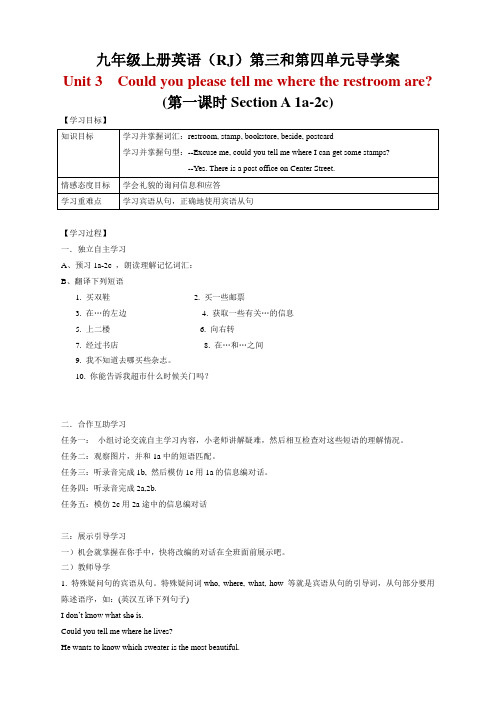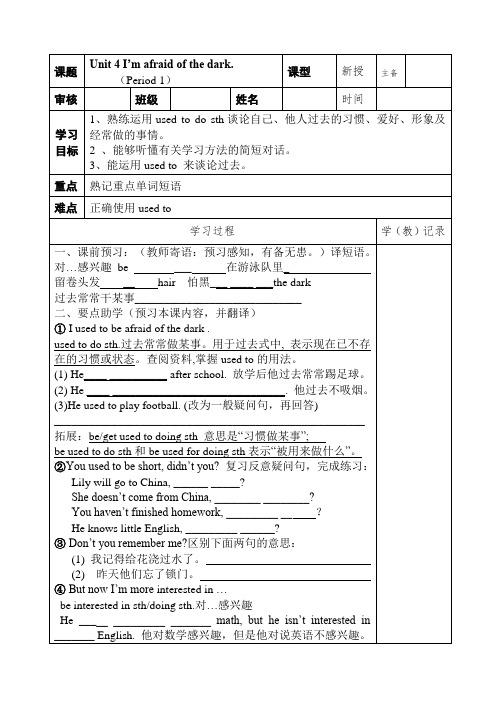2019秋人教版英语九年级上册(RJ)Unit 4 导学案
Unit4导学案人教版九年级英语全册

九年级英语unit4 I used to be afraid of the dark导学案主备人:Miss Zhang 第一课时SectionA(1a2d)一,学习目标Mario, you used to be short, didn’t you?ed to do 过去常常做(某事)use to be 过去曾是他过去放学后常打篮球2.否定式didn’t use to她以前没留长发3.疑问式Did sb use to do?他过去是老师吗?4.本句是个反意疑问句,特点“前否后肯,前肯后否”。
前半句若含有表否定意义的词,如never,hardly, few等时,后半句要用肯定形式。
后半句在人称,时态和数等方面必须与前半句保持一致。
你是个医生,是吗?You are a doctor, ?她不喜欢弹钢琴,对吗? She doesn’t like playing the piano, ?二,课堂检测1.He is a h young man. He always makes us laugh.2.The teacher often tells the children to keep s_______ when someone is talking.3.Tom (change) a lot in the past few years.4.I saw him (lie) on the playground just now.5.( ) Peter in the countryside, but now he in the city.A. used to living; used to liveB. is used to living; used to liveC. is used to live; used to liveD. used to live; is used to living6.( ) There a lot of trees here, but now it bees a desert.A. isB. haveC. used to beD. used to being7.( )Tom didn’t use to have long hair, ?A. did heB. didn’t heC. did TomD. didn’t Tom8. 自从两年前,我就习惯了戴眼镜。
2019秋人教版英语九年级上册(RJ)Unit4导学案

2019秋人教版英语九年级上册(RJ)Unit4导学案九年级(上)英语(RJ)导学案Unit 4 I used to be afraid of the dark【单元学习目标】(1)知识与技能:掌握重点单词、短语、句型,学会运用used to 句型及其相似的句型。
(2)过程与方法:通过多媒体教学,让学生通过独立学习、合作交流、互相帮助的学习方法来获得知识,培养学生的自主学习能力。
(3)情感态度与价值观:通过本单元的学习,让学生学会观察同一个事物或者人以前和现在的变化,让学生更加关注身边的美好事物。
第一课时Section A 1a—2d【学习目标】:一、语法(used to do sth.的用法)1. used to do sth. “过去常常做某事”表示过去的习惯动作或状态,现在已不再发生或不存在。
e.g. I never used to eat cakes, but I eat a lot now.过去我从不吃蛋糕,但是现在我吃很多。
2. used to do sth.的否定形式:used not to do sth.或didn’t use to do sth.一般疑问句形式:Did sb. use to do sth.? 或Used sb. to do sth.?3. 相似短语:be/get/become used to doing sth. 习惯于做某事e.g. Mary is used to wearing a T-shirt and jeans.玛丽习惯于穿T恤衫和牛仔裤。
be used to do sth. 被用来做某事e.g. Wood can be used to make paper. 木头能被用来造纸。
【巩固练习】单项选择题()1.Mary used to ___ to work, but she is used to _____ towork now.A. riding a bike; taking a busB. riding a bike; take a busC. ride a bike; taking a busD. ride a bike; take a bus()2.She ______ lives alone. But she_____ living alone because she feels lonely.A. used to; doesn’t used toB. is used to; was used toC. used to; is not used toD. was used to; doesn’t used to()3.—How is your grandma?--She’s fine. She used to _______TV at home after supper. But now sh e is used to _______ out for a walk.A. watch; goB. watching; goC. watching; goingD. watch; going()4.Her son _____Coke, but now he _____milk.A. used to drink; is used to drinkingB. used to drinking; drinksC. is used to drinking; used to drinkD. is used to drinks; is drinking二、词汇目标:1.What be sb. like? 对性格提问What do/does sb. look like? 对外貌、长相提问2.humorous adj. 有幽默感的,滑稽有趣的humor n.幽默,诙谐humorist n. 有幽默感的人3.silent adj. 沉默的,不说话的silence n. 沉默,寂静keep silent 保持沉默4.helpful adj. 有用的,有帮助的be helpful to sb./sth. 对某人/某物有帮助5. on a ... team 在....队里6.from time to time 时常,有时e.g. Good ideas swim into my mind from time to time.7. This party is such a good idea! 这个聚会是如此棒的一个主意!such + a/an + adj. + n.= so + adj. + a/an +n.8.I agree 我同意= I think so表示不同意时用I don’t agree 或I disagree9.It’s been three years since we last saw our primary school classmates.自从我们上次小学同学见面以来已经有三年的时间了。
九年级英语上册unit4单元课时导学案人教版

九年级英语上册unit4单元课时导学案(人教版)九年级英语上册unit4单元课时导学案(人教版)Unit 4 I used to be afraiddaPeriod 1一.学习新单词humorou /hju:mərəs/ a. 有幽默感的;滑稽的silent /sailənt/ adj. 不说话的;沉默的helpful /helpfl/adj. 有用的;有帮助的时常;有时/skɔ:( r)/ n. v. 得分;打分background /bækgraund/ n. 背景view/Intə (r)vju:/ v. 采访;面试n.访谈Asian/eiʃn, /adj. 亚洲/人的; n. 亚洲人deal with 对付; 应付dare /deə/, /der/ v. 敢于;胆敢vate/praivət/ adj. 私人的;私密的guard /ga:(r)d/ n. 警卫;看守v. 守卫;保卫require /rikwaiə(r)/ v. 需要;要求British /britiʃ/ adj. 英国的;英国人的/spi:tʃ/ n. 讲话;发言ant / ænt/ n. 蚂蚁/insekt/ n. 昆虫luence/influəns/ v. n. 影响ldom /seldəm/ adv. 不常;很少ud /praud/ adj. 自豪的;骄傲的be proud of 为骄傲;感到自豪absent / æbsənt/ adj. 缺席;不在fail /feil/ v. 失败;未能(做到)examination /igzæmineiʃn/ n. 考试;审查boarding /bɔ:(r)diŋ/ school `寄宿学校亲身;亲自exactly /igzæktli/ adv. 确切地;精确地pride /praid/ n. 自豪;骄傲take pride in 为感到自豪grandson /grænsʌn/ n. 孙子;外孙general /dʒenrəl/ a. 普遍的;常规的;总的将军 p.32duction /intrədʌkʃn/ n. 介绍 p.32Paula /pɔ:lə/ 葆拉(女名) p.26Alfred /ælfrid/ 艾尔弗雷德(男名) p.26 Billy /bili/ 比利(男名)p.2andy /kændi/ 坎迪(女名) p.2/dʒeri/ 杰里(男名);杰丽(女名)p.2ly /emili/ 埃米莉(女名) p.28Period 2一.学习used to 的用法used to的含义为“__________________”,是一个固定结构,其后跟动词原形,它表示过去的某种经常性,习惯性的行为或动作,并暗示现在已无此习惯。
2019年秋人教版九年级上册英语教案:Unit4SectionB(1a-2f)

-口语表达:对于一些学生来说,用英语表达个人观点和情感可能是一个挑战,特别是在讨论个人职业选择时。
-写作能力:在撰写关于理想职业的短文时,学生可能不知道如何组织文章结构和运用合适的句型。
举例:在2d完成句子活动中,学生可能会在运用现在进行时态描述职业特点时遇到困难,如“Teachers are responsible for teaching students.”和“Doctors are achieving great things in medicine.”这样的句子结构需要重点讲解和练习。
四、教学流程
(一)导入新课(用时5分钟)
同学们,今天我们将要学习的是Unit 4 Section B的1a-2f部分,探讨与职业相关的话题。在开始之前,我想先问大家一个问题:“你们有没有想过自己将来想做什么职业?”这个问题与我们将要学习的内容密切相关。通过这个问题,我希望能够引起大家对未来职业的兴趣,让我们一同探索不同职业的奥秘。
2019年秋人教版九年级上册英语教案:Unit 4 Section B (1a-2f)
一、教学内容
2019年秋人教版九年级上册英语教案:Unit 4 Section B (1a-2f)
本节课我们将学习Unit 4 Section B的1a-2f部分,内容主要包括:
1. 1a部分:通过图片和关键词,让学生预测和理解与职业相关的词汇。
二、核心素养目标
本节课的核心素养目标主要包括:
1.提高学生的语言理解能力:通过听力、阅读练习,使学生能够理解并运用与职业相关的词汇和表达,增强语感。
九年级英语上册unit4单元课时导学案(人教版)

九年级英语上册unit4单元课时导学案(人教版)课时一: Reading本节课的学习目标是阅读理解文章,掌握关键词和短语,提高阅读效果。
一、预习导引在本节课中,我们将阅读一篇关于长城的文章。
在阅读之前,请完成以下预习任务:1.快速浏览文章,了解文章的大致内容和结构。
2.找出并学习一些关键词和短语,例如“Great Wall”(长城)、“tourists”(游客)、“history”(历史)等。
二、阅读理解请认真阅读以下文章,并回答下面的问题:The Great Wall of ChinaThe Great Wall is a famous landmark in China. It is over 21,000 kilometers long. It was built thousands of years ago. It was built to keep out invaders.The Great Wall is made of stone, brick, and earth. It is very wide in some places, and very narrow in others. Some parts of the wall are quite steep.Every year, millions of tourists from all over the world visit the Great Wall. They come to learn about the history of China and to experience the grandeur of this ancient wonder.If you ever visit China, make sure you see the Great Wall. It is truly a sight to behold!问题:1.What is the Great Wall?2.Why was the Great Wall built?3.What is the Great Wall made of?4.What do tourists do when they visit the Great Wall?5.What is the author’s suggestion to readers?三、课堂讨论请同学们回答上面的问题,并进行一次课堂讨论。
人教版九年级英语上册《Unit 4 Section A》导学案

《Unit 4 Section A》导学案课题:Unit 4 Section A班级:姓名:【学习目标】1.掌握本课所涉及到的新生词,如humorous silent helpful等2.掌握并学会运用本课所涉及的重点短语,如from time to time、get good grades等3.理解并会运用used to4.熟读2d、3a的对话和短文,并且理解其中的重点句型【预习案】一、已学知识回顾重点单词:1.humorous(adj.)有幽默感的;滑稽有趣的2.silent(adj.)不说话的;沉默的3.helpful(adj.)有用的;有帮助的4.score(n.&v.)得分;进球5.background(n.)背景6.interview(v.)面试;采访(n.)面试;访谈n(adj.)亚洲的;亚洲人的(n.)亚洲人8.dare(v.)敢于;胆敢9.private(adj.)私人的;私密的10.guard(n.)警卫;看守(v.)守卫;保卫11.require(v.)需要;要求12.European(adj.)欧洲的;欧洲人的13.African(adj.)非洲的;非洲人的14.British(adj.)英国的;英国人的15.speech(n.)讲话;发言16.public(n.)民众(adj.)公开的;公众的二、预习指导2b.1.过去曾经 2.足够勇敢 3.取得好成绩 4.对…感兴趣5.成为某团队中的一员6.时常;有时2d 1..如此好的一个主意 2.变红 3.看到某人正在阅读4. 取得好的分数3a. 1.从事歌唱 2.对付,应对 3.一个十九岁的 4.敢于5.在众人面前 6.得到大量的关注7.与…闲逛8.准备…9.放弃10. 5.坚持,奋斗前行11. 很小一部分12.达成;成功4a 1.阅读有关欧洲历史的书 2.非洲文化3.教美式英语4b.享受乡村音乐4c.1. 惧怕黑暗2.独处3.作一个公开演讲【探究案】used to do sth. 的用法ed to do sth.表示“过去常常做某事”,将过去和现在对比,暗示现在不做了。
新人教版九年级上册英语(RJ)第三和第四单元导学案教案设计

九年级上册英语(RJ)第三和第四单元导学案Unit 3 Could you please tell me where the restroom are?(第一课时Section A 1a-2c)【学习目标】【学习过程】一.独立自主学习A、预习1a-2c ,朗读理解记忆词汇:B、翻译下列短语1. 买双鞋____________________2. 买一些邮票_______________________3. 在…的左边__________________4. 获取一些有关…的信息_____________5. 上二楼___________________6. 向右转_____________________7. 经过书店_________________ 8. 在…和…之间___________________9. 我不知道去哪买些杂志。
_________________________________________10. 你能告诉我超市什么时候关门吗?____________________________________________________________二.合作互助学习任务一:小组讨论交流自主学习内容,小老师讲解疑难,然后相互检查对这些短语的理解情况。
任务二:观察图片,并和1a中的短语匹配。
任务三:听录音完成1b, 然后模仿1c用1a的信息编对话。
任务四:听录音完成2a,2b.任务五:模仿2c用2a途中的信息编对话三:展示引导学习一)机会就掌握在你手中,快将改编的对话在全班面前展示吧。
二)教师导学1. 特殊疑问句的宾语从句。
特殊疑问词who, where, what, how 等就是宾语从句的引导词,从句部分要用陈述语序,如:(英汉互译下列句子)I do n’t know what she is.Could you tell me where he lives?He wants to know which sweater is the most beautiful.请告诉我你什么时候起床。
九年级上册英语unit4全单元导学案

重点
熟记重点单词短语
难点
进一步掌握used to并运用
学习过程
学(教)记录
一、课前预习。(教师寄语:预习感知,有备无患)
要点助学(预习本课内容,在课本上划出下列句子,并翻译)
①alone独自一人的, lonely孤独的,寂寞的能从意思上看出两单词的区别吗?
This little boy lived in this house ______, but he didn’t feel_____.
三、课堂活动(教师寄语:展示自我,合作提高)
1检查课前预习,各小组展示讨论并探索存在的问题。2.朗读单词,完成1a
3两人一组谈论过去的外表、性格等及与现在的不同。例如:I used to be short, but now I am tall. (用quiet ,shy/outgoing, have straight hair/have curly hair等谈论P10(1a) )。
4. Where ___________ live before you came here?
A. did you used to B. did you use to C. use he to D. he used to
5.My sister used to have long hair,?
A. used she B. didn’t she C. have she? D. did she
①I used to be afraid of the dark .
used to do sth.过去常常做某事。用于过去式中,表示现在已不存在的习惯或状态。查阅资料,掌握used to的用法。
(1) He____ __________after school.放学后他过去常常踢足球。
- 1、下载文档前请自行甄别文档内容的完整性,平台不提供额外的编辑、内容补充、找答案等附加服务。
- 2、"仅部分预览"的文档,不可在线预览部分如存在完整性等问题,可反馈申请退款(可完整预览的文档不适用该条件!)。
- 3、如文档侵犯您的权益,请联系客服反馈,我们会尽快为您处理(人工客服工作时间:9:00-18:30)。
九年级(上)英语(RJ)导学案Unit 4 I used to be afraid of the dark【单元学习目标】(1)知识与技能:掌握重点单词、短语、句型,学会运用used to句型及其相似的句型。
(2)过程与方法:通过多媒体教学,让学生通过独立学习、合作交流、互相帮助的学习方法来获得知识,培养学生的自主学习能力。
(3)情感态度与价值观:通过本单元的学习,让学生学会观察同一个事物或者人以前和现在的变化,让学生更加关注身边的美好事物。
第一课时Section A 1a—2d【学习目标】:一、语法(used to do sth.的用法)1. used to do sth. “过去常常做某事”表示过去的习惯动作或状态,现在已不再发生或不存在。
e.g. I never used to eat cakes, but I eat a lot now.过去我从不吃蛋糕,但是现在我吃很多。
2. used to do sth.的否定形式:used not to do sth.或didn’t use to do sth.一般疑问句形式:Did sb. use to do sth.? 或Used sb. to do sth.?3. 相似短语:be/get/become used to doing sth. 习惯于做某事e.g. Mary is used to wearing a T-shirt and jeans.玛丽习惯于穿T恤衫和牛仔裤。
be used to do sth. 被用来做某事e.g. Wood can be used to make paper. 木头能被用来造纸。
【巩固练习】单项选择题()1.Mary used to ___ to work, but she is used to _____ to work now.A. riding a bike; taking a busB. riding a bike; take a busC. ride a bike; taking a busD. ride a bike; take a bus()2.She ______ lives alone. But she_____ living alone because she feels lonely.A. used to; doesn’t used toB. is used to; was used toC. used to; is not used toD. was used to; doesn’t used to()3.—How is your grandma?--She’s fine. She used to _______TV at home after supper. But now sh e is used to _______ out for a walk.A. watch; goB. watching; goC. watching; goingD. watch; going()4.Her son _____Coke, but now he _____milk.A. used to drink; is used to drinkingB. used to drinking; drinksC. is used to drinking; used to drinkD. is used to drinks; is drinking二、词汇目标:1.What be sb. like? 对性格提问What do/does sb. look like? 对外貌、长相提问2.humorous adj. 有幽默感的,滑稽有趣的humor n.幽默,诙谐humorist n. 有幽默感的人3.silent adj. 沉默的,不说话的silence n. 沉默,寂静keep silent 保持沉默4.helpful adj. 有用的,有帮助的be helpful to sb./sth. 对某人/某物有帮助5. on a ... team 在....队里6.from time to time 时常,有时e.g. Good ideas swim into my mind from time to time.7. This party is such a good idea! 这个聚会是如此棒的一个主意!such + a/an + adj. + n.= so + adj. + a/an +n.8.I agree 我同意= I think so表示不同意时用I don’t agree 或I disagree9.It’s been three years since we last saw our primary school classmates.自从我们上次小学同学见面以来已经有三年的时间了。
It’s been +一段时间+since+从句“自从...以来已经有多长时间了”。
还可以表示为“It is +一段时间+since+从句”。
since 此处用作连词,意为“自从,自...以来”。
主句常用完成时态,且动词需用延续性动词。
since 后接从句,该从句用一般过去时态。
10.Yeah, his face always turned red when he talked to girls!是的,当他跟女孩说话时脸总是会变红!* turn“变成”,多用于在颜色或性质等方面的变化,强调变化的结果。
e.g. The leaves turned red and yellow in autumn.become“变得,成为”通常指身份、职位的变化,强调变化的过程已经完成。
e.g. She became an English teacher.*get“变得”,多用于口语,表示一种变化过程,强调“渐渐变得”,其后常接形容词比较级。
e.g. In winter, the days get shorter.11.see sb. doing sth. 看见某人正在做某事see sb. do sth. 看见某人做了某事【学习步骤】:略巩固练习:(一)根据汉语意思完成句子。
1.----艾丽斯是个怎么样的人?-----她很善良和幽默。
----- What _______ Alice _________?----- She is kind and ______________.2.我的老师送给我许多英语方面有用的书。
My teacher _______ me lots of __________ books in English.3.他跑的足够快。
He runs _________ ___________.4.自从我开始学英语已经有5年的时间了。
It _____ ______ five years ______ I _______ _______ learn English.5.我那时看见一些老人正在打中国的太极拳。
I _______ some old people _________ Chinese Taiji.第二课时Section A 3a—4c【学习目标】一、词汇目标:1.interview v.采访,面试interview sb. about sth. 就某事采访某人interview n.采访,面试,访谈give an interview 接受采访2.take up 开始从事,开始做take up doing sth. 开始做某事take up 还可以表示“占去(时间、空间等)”3.deal with= do with“对付、应付、处理”在特殊疑问句中,deal with与how连用,do with与what连用在动词不定式to deal with中,必须带宾语e.g. I don’t know how to deal with it.我不知道如何处理这件事。
4.As she got better, she dared to sing in front of her class, and then for the whole school.当她变得好一点的时候,她敢在全班同学面前唱歌,后来敢为全校同学唱歌。
dare to do sth. “敢于做某事”,其中to 有时可以省略。
5. not.....anymore(any more)= no more “不再”一般表示次数和动作不再重复,多与短暂性动词连用。
e.g. Peter buys a car. He won’t go to work by bike anymore.not......any longer= no longer 表示时间不再延续,多与延续性动词连用e.g. Her father died, and after that she didn’t go to school any longer.6. crowd n.人群,群众v. 拥挤crowded adj.拥挤的7....... but now I get tons of attention everywhere I go. ……但是现在我去哪里都受到极大的关注。
tons of 大量的,许多的= a lot of = lots of8. worry about=be worried about 为……担心,为……烦恼9. hang out 闲逛,闲荡hang--hang--hanghang作动词,还可表示“悬挂”,其过去式和过去分词均为hung.hang up 把……悬挂/挂起10.you have to be prepared to give up your normal life.你必须准备放弃你的正常生活。
prepare v.准备,预备prepared adj.事先准备好的preparation n.准备be prepared to do sth. 准备做某事11.You can never imagine how difficult the road to success is.你想象不到成功的路有多难。
the road to success 成功之路12.You really require a lot of talent and hard work to succeed.你真的需要很多的才艺和努力工作才能取得成功。
require v.“需要,需求”后可接名词、动词不定式、动名词或that从句作宾语。
e.g. How much money do you require?13.Only a very small number of people make it to the top.只有少数人能出人头地。
